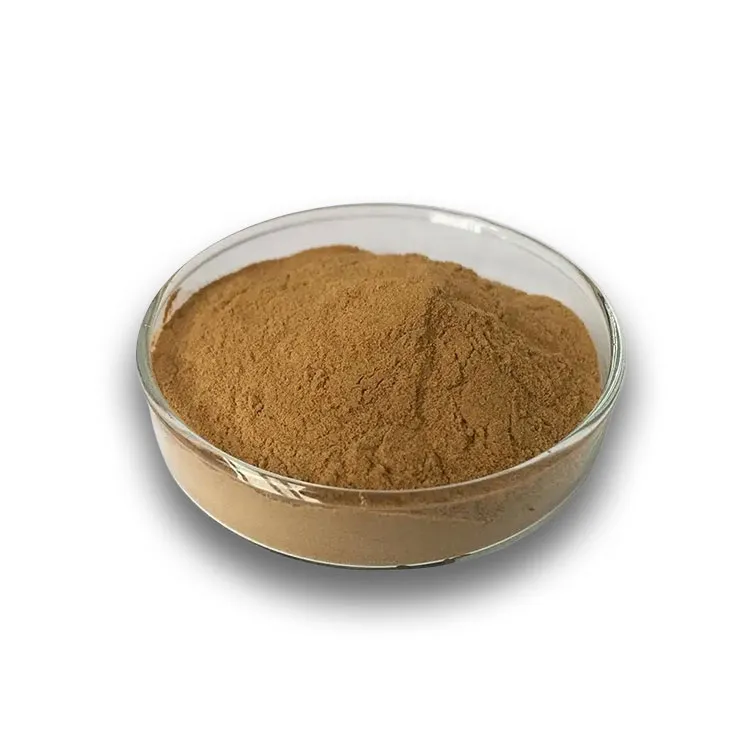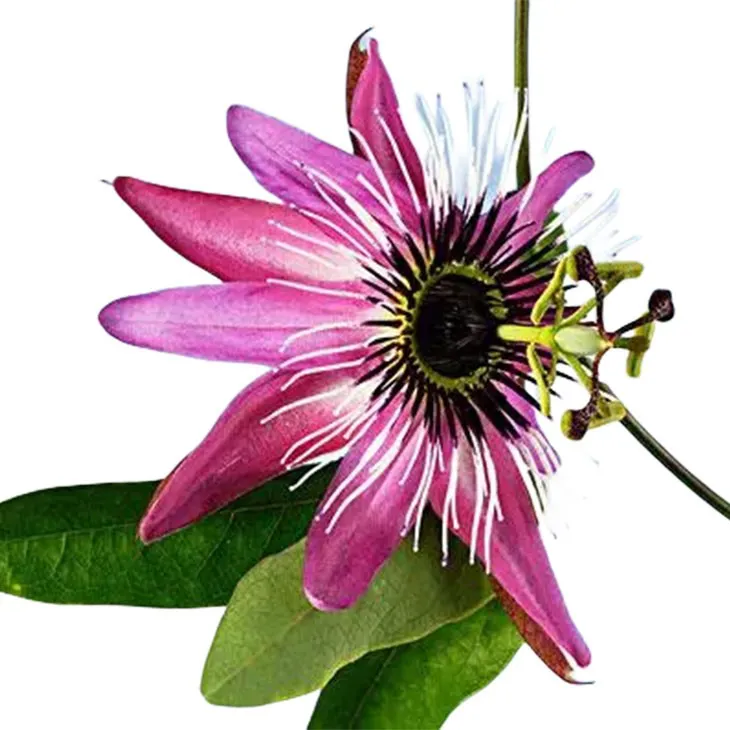- 0086-571-85302990
- sales@greenskybio.com
Passionflower extract: a herbal medicine for treating anxiety and insomnia.
2024-11-12

1. Introduction
Anxiety and insomnia are two common health issues that can significantly impact an individual's quality of life. In the quest for effective treatments, Passionflower Extract has emerged as a potential herbal remedy. This article aims to provide a comprehensive exploration of Passionflower Extract in the context of treating anxiety and insomnia, covering aspects such as its mechanism of action, safety, side effects, and comparison with conventional medications, as well as its cultural significance.

2. What is Passionflower Extract?
Passionflower (Passiflora incarnata) is a climbing vine native to the southeastern United States and Central and South America. The extract is obtained from the various parts of the plant, including the leaves, flowers, and stems. It contains a variety of bioactive compounds, such as flavonoids, alkaloids, and glycosides, which are believed to be responsible for its medicinal properties.

3. Mechanism of Action for Anxiety and Insomnia
3.1. For Anxiety
Passionflower extract is thought to work on the nervous system to reduce anxiety. It may act as a mild sedative, increasing the levels of gamma - aminobutyric acid (GABA) in the brain. GABA is an inhibitory neurotransmitter that helps to calm nerve activity. By enhancing GABA function, passionflower extract can potentially reduce the excessive neuronal excitability associated with anxiety.
3.2. For Insomnia
Similar to its effect on anxiety, the sedative properties of passionflower extract can also be beneficial for insomnia. It can help to relax the body and mind, making it easier to fall asleep. Additionally, its potential to regulate the neurotransmitter systems involved in sleep - wake cycles may contribute to improving sleep quality.

4. Safety Profile
When used appropriately, passionflower extract is generally considered safe. However, as with any herbal remedy, there are some factors to consider.
4.1. Allergic Reactions
Some individuals may be allergic to passionflower. Symptoms of an allergic reaction can include skin rashes, itching, swelling, and in severe cases, difficulty breathing. It is important to discontinue use if any signs of an allergic reaction occur.
4.2. Interaction with Medications
Passionflower extract may interact with certain medications. For example, it could potentiate the effects of sedative - hypnotic drugs, such as benzodiazepines. This may increase the risk of excessive sedation. It is crucial for individuals taking other medications to consult a healthcare provider before using passionflower extract.

5. Potential Side Effects
While passionflower extract is relatively safe, some side effects have been reported.
- Drowsiness: This is the most common side effect, especially when taken in higher doses. It can interfere with daily activities such as driving or operating machinery.
- Nausea and vomiting: In some cases, individuals may experience gastrointestinal discomfort after taking passionflower extract.
- Headache: A small number of users may report headaches as a side effect.
6. Comparison with Conventional Medications
6.1. Efficacy
Several studies have compared the efficacy of passionflower extract with conventional anti - anxiety and sleep medications. While some research suggests that passionflower extract can be effective in reducing anxiety symptoms, it may not be as potent as some prescription medications, such as selective serotonin reuptake inhibitors (SSRI) for severe anxiety disorders. However, for mild to moderate anxiety and insomnia, it may offer a viable alternative with fewer potential side effects.
6.2. Side Effects
Conventional medications for anxiety and insomnia often come with a range of side effects, including drowsiness, dry mouth, constipation, and in some cases, more serious adverse effects such as dependence and withdrawal symptoms. In contrast, passionflower extract has a relatively milder side - effect profile, making it an attractive option for those who are sensitive to the side effects of pharmaceutical drugs.
7. Cultural Significance
Passionflower has a rich cultural history.
7.1. Indigenous Use
Native American tribes have long used passionflower for its medicinal properties. It was used to treat various ailments, including anxiety, insomnia, and pain. The plant was also part of their traditional healing practices and cultural heritage.
7.2. European Influence
In European herbal medicine, passionflower has been used for centuries. It was introduced to Europe in the 16th century and quickly became popular as a natural remedy. Its use was documented in many herbal pharmacopoeias, and it has been passed down through generations as a trusted herbal treatment.
8. How to Use Passionflower Extract
There are different forms of passionflower extract available, including capsules, tinctures, and teas.
8.1. Capsules
Capsules are a convenient way to take passionflower extract. The recommended dosage typically ranges from 300 - 500 mg per day, depending on the individual's needs and the concentration of the extract. However, it is important to follow the instructions on the product label or consult a healthcare provider.
8.2. Tinctures
Tinctures are liquid extracts that can be taken sublingually (under the tongue) or diluted in water. The typical dosage for tinctures is around 1 - 2 ml, two to three times a day. It is essential to measure the dosage accurately using a dropper provided with the tincture.
8.3. Teas
Passionflower tea can be made by steeping dried passionflower leaves or flowers in hot water for about 10 - 15 minutes. Drinking a cup of passionflower tea before bedtime can be a soothing way to promote relaxation and sleep. However, the potency of tea may be lower compared to capsules or tinctures.
9. Research and Future Directions
Although there has been some research on passionflower extract for anxiety and insomnia, more studies are needed.
9.1. Standardization of Extracts
One area of research is the standardization of passionflower extracts. Different products may vary in their composition and potency, which can affect their efficacy. Standardizing the extracts would ensure consistent quality and more reliable results in clinical trials.
9.1. Long - term Studies
Most of the existing studies on passionflower extract are short - term. Long - term studies are required to determine its safety and effectiveness over extended periods, especially for chronic anxiety and insomnia conditions.
10. Conclusion
Passionflower extract offers a promising herbal option for the treatment of anxiety and insomnia. It has a relatively good safety profile, with mild side effects compared to conventional medications. Its cultural significance also adds to its appeal as a natural remedy. However, further research is needed to fully understand its mechanisms of action, optimize its use, and ensure its long - term safety and efficacy. Individuals considering using passionflower extract should consult a healthcare provider, especially if they are taking other medications or have underlying health conditions.
FAQ:
What is passionflower extract?
Passionflower extract is a substance derived from the passionflower plant. It contains various bioactive compounds such as flavonoids, alkaloids, and glycosides. These components are thought to contribute to its potential effects on treating anxiety and insomnia.
How does passionflower extract help with anxiety?
It is believed that passionflower extract may work on the nervous system by interacting with neurotransmitters. It may increase the levels of gamma - aminobutyric acid (GABA) in the brain. GABA is an inhibitory neurotransmitter that helps to reduce neuronal excitability, thus potentially alleviating anxiety symptoms.
Is passionflower extract safe to use?
When used appropriately, passionflower extract is generally considered safe for most people. However, some individuals may experience mild side effects such as drowsiness, dizziness, or nausea. Pregnant or breastfeeding women, as well as those taking certain medications, should consult a healthcare provider before using passionflower extract.
How does passionflower extract compare to conventional anxiety medications?
Unlike some conventional anxiety medications, passionflower extract is a natural herbal remedy. It may have a milder effect and fewer side effects compared to some synthetic drugs. However, its effectiveness may vary from person to person. While conventional medications are often more rigorously tested in large - scale clinical trials, passionflower extract has been used traditionally and is now also being studied in more modern research settings.
What is the cultural significance of passionflower as a remedy?
Passionflower has a long history of use in different cultures. For example, in some Native American cultures, it has been used for its calming and sedative properties. In traditional herbal medicine systems around the world, it has been valued for its potential to treat various ailments related to the nervous system, including anxiety and insomnia. This cultural heritage has contributed to its continued interest and use as a natural remedy today.
Related literature
- The Efficacy of Passionflower Extract in the Treatment of Anxiety Disorders"
- "Passionflower: A Traditional Remedy for Insomnia Revisited"
- "Comparative Study of Passionflower Extract and Benzodiazepines in Anxiety Management"
- ▶ Hesperidin
- ▶ citrus bioflavonoids
- ▶ plant extract
- ▶ lycopene
- ▶ Diosmin
- ▶ Grape seed extract
- ▶ Sea buckthorn Juice Powder
- ▶ Beetroot powder
- ▶ Hops Extract
- ▶ Artichoke Extract
- ▶ Reishi mushroom extract
- ▶ Astaxanthin
- ▶ Green Tea Extract
- ▶ Curcumin Extract
- ▶ Horse Chestnut Extract
- ▶ Other Problems
- ▶ Boswellia Serrata Extract
- ▶ Resveratrol Extract
- ▶ Marigold Extract
- ▶ Grape Leaf Extract
- ▶ blog3
-
High purity olive leaf extract
2024-11-12
-
Lavender oil extraction method
2024-11-12
-
100% organic virgin sea buckthorn fruit oil
2024-11-12
-
Lotus leaf extract powder factory in China
2024-11-12
-
China aged garlic extract supplier
2024-11-12
-
Deer antler extract powder manufacturer
2024-11-12
-
Saw palmetto extract vs whole herb
2024-11-12
-
Yam Extract
2024-11-12
-
Tormentil Extract
2024-11-12
-
Resveratrol extract
2024-11-12
-
Berberis aristata Extract
2024-11-12
-
Bilberry Extract
2024-11-12
-
Cranberry Extract
2024-11-12
-
White mustard seed extract
2024-11-12
-
Horse Chestnut Extract
2024-11-12
-
Calendula Extract
2024-11-12
-
Dandelion Leaf Extract
2024-11-12





















